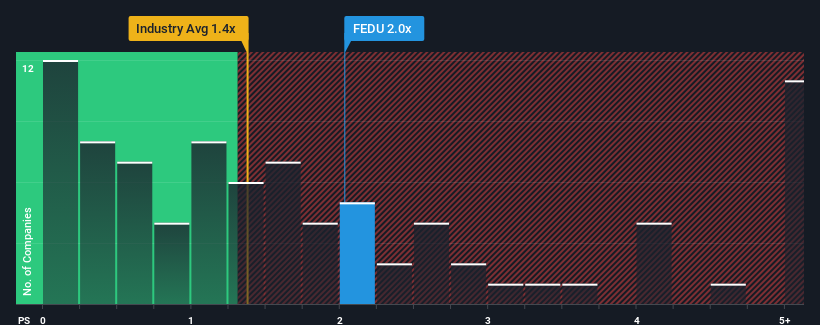- United States
- /
- Consumer Services
- /
- NYSE:FEDU
Four Seasons Education (Cayman) Inc. (NYSE:FEDU) Investors Are Less Pessimistic Than Expected

When you see that almost half of the companies in the Consumer Services industry in the United States have price-to-sales ratios (or "P/S") below 1.4x, Four Seasons Education (Cayman) Inc. (NYSE:FEDU) looks to be giving off some sell signals with its 2x P/S ratio. Although, it's not wise to just take the P/S at face value as there may be an explanation why it's as high as it is.
Check out our latest analysis for Four Seasons Education (Cayman)

What Does Four Seasons Education (Cayman)'s P/S Mean For Shareholders?
As an illustration, revenue has deteriorated at Four Seasons Education (Cayman) over the last year, which is not ideal at all. It might be that many expect the company to still outplay most other companies over the coming period, which has kept the P/S from collapsing. If not, then existing shareholders may be quite nervous about the viability of the share price.
We don't have analyst forecasts, but you can see how recent trends are setting up the company for the future by checking out our free report on Four Seasons Education (Cayman)'s earnings, revenue and cash flow.Is There Enough Revenue Growth Forecasted For Four Seasons Education (Cayman)?
In order to justify its P/S ratio, Four Seasons Education (Cayman) would need to produce impressive growth in excess of the industry.
Retrospectively, the last year delivered a frustrating 3.7% decrease to the company's top line. This means it has also seen a slide in revenue over the longer-term as revenue is down 74% in total over the last three years. Therefore, it's fair to say the revenue growth recently has been undesirable for the company.
Weighing that medium-term revenue trajectory against the broader industry's one-year forecast for expansion of 16% shows it's an unpleasant look.
With this in mind, we find it worrying that Four Seasons Education (Cayman)'s P/S exceeds that of its industry peers. Apparently many investors in the company are way more bullish than recent times would indicate and aren't willing to let go of their stock at any price. There's a very good chance existing shareholders are setting themselves up for future disappointment if the P/S falls to levels more in line with the recent negative growth rates.
The Final Word
Using the price-to-sales ratio alone to determine if you should sell your stock isn't sensible, however it can be a practical guide to the company's future prospects.
Our examination of Four Seasons Education (Cayman) revealed its shrinking revenue over the medium-term isn't resulting in a P/S as low as we expected, given the industry is set to grow. Right now we aren't comfortable with the high P/S as this revenue performance is highly unlikely to support such positive sentiment for long. Should recent medium-term revenue trends persist, it would pose a significant risk to existing shareholders' investments and prospective investors will have a hard time accepting the current value of the stock.
There are also other vital risk factors to consider and we've discovered 3 warning signs for Four Seasons Education (Cayman) (2 don't sit too well with us!) that you should be aware of before investing here.
If these risks are making you reconsider your opinion on Four Seasons Education (Cayman), explore our interactive list of high quality stocks to get an idea of what else is out there.
If you're looking to trade Four Seasons Education (Cayman), open an account with the lowest-cost platform trusted by professionals, Interactive Brokers.
With clients in over 200 countries and territories, and access to 160 markets, IBKR lets you trade stocks, options, futures, forex, bonds and funds from a single integrated account.
Enjoy no hidden fees, no account minimums, and FX conversion rates as low as 0.03%, far better than what most brokers offer.
Sponsored ContentNew: AI Stock Screener & Alerts
Our new AI Stock Screener scans the market every day to uncover opportunities.
• Dividend Powerhouses (3%+ Yield)
• Undervalued Small Caps with Insider Buying
• High growth Tech and AI Companies
Or build your own from over 50 metrics.
Have feedback on this article? Concerned about the content? Get in touch with us directly. Alternatively, email editorial-team (at) simplywallst.com.
This article by Simply Wall St is general in nature. We provide commentary based on historical data and analyst forecasts only using an unbiased methodology and our articles are not intended to be financial advice. It does not constitute a recommendation to buy or sell any stock, and does not take account of your objectives, or your financial situation. We aim to bring you long-term focused analysis driven by fundamental data. Note that our analysis may not factor in the latest price-sensitive company announcements or qualitative material. Simply Wall St has no position in any stocks mentioned.
About NYSE:FEDU
Four Seasons Education (Cayman)
Provides after-school education services for kindergarten, elementary, and middle school students in the People’s Republic of China and internationally.
Adequate balance sheet low.
Similar Companies
Market Insights
Community Narratives




